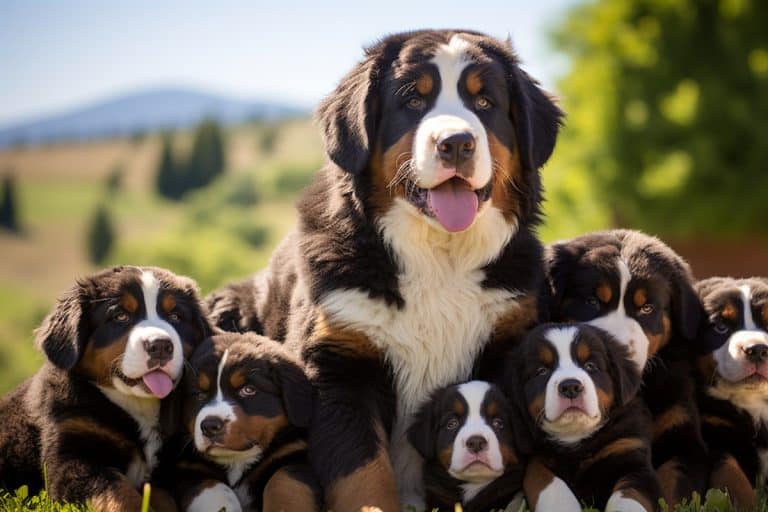Breeding a Bernese Mountain Dog can be an exciting and rewarding journey. These gentle giants, with their friendly and affectionate nature, make excellent family pets. However, breeding requires a great deal of responsibility and knowledge. In this guide, you’ll learn everything you need to know about breeding Bernese Mountain Dogs, ensuring a healthy and happy litter.
Preparing for Breeding
Breeding is a big responsibility. It’s crucial to ensure that the breeding dogs are healthy and have good temperaments.
Health Screenings and Genetic Testing
Before breeding, have your Bernese Mountain Dog undergo health screenings and genetic testing. This helps to identify and prevent common health issues like hip and elbow dysplasia, which are common in this breed. By selecting dogs with good health, you’re taking a step towards having healthier puppies.
Financial, Time, and Emotional Investments
Breeding is not just about having cute puppies around. It demands time, money, and emotional strength. From vet bills to the time spent caring for the mother and puppies, it’s a significant commitment. Prepare yourself for the journey ahead, ensuring you have the resources and support needed.
Suitable Environment
Creating a safe and comfortable environment for the mother and puppies is vital. Make sure you have a clean, warm, and secure space for them to grow and thrive.
How Many Puppies Do Bernese Mountain Dogs Have?
A typical Bernese Mountain Dog litter has between 6 to 10 puppies. However, this can vary based on the mother’s age and health. Larger and healthier dogs may have bigger litters. It’s essential to have a spacious and comfortable area for the mother to nurture her puppies.
Selecting a Suitable Mate
Finding the right mate for your Bernese Mountain Dog is a key step in the breeding process. It’s not just about finding another beautiful Bernese Mountain Dog, but ensuring they complement each other well. Here’s a closer look at how you can go about this crucial task:
Complementary Traits and Good Health History
When looking for a mate for your Bernese Mountain Dog, it’s essential to find a dog with traits that complement your own dog’s strengths and weaknesses. For example, if your dog has excellent coat quality but a less-than-ideal hip score, you might look for a mate with strong hip ratings to help balance these traits in the puppies.
A good health history is equally important. Dive into the health records of the prospective mate and their family. Look for a mate whose lineage has a strong history of health, free from common genetic issues like hip and elbow dysplasia, which are prevalent in Bernese Mountain Dogs. The goal is to breed puppies with the best chance of living long, healthy lives.
Working With Experienced Breeders
If you’re new to the world of breeding, it can be incredibly helpful to work with experienced breeders. They can provide insights into selecting a suitable mate for your dog, as they have a wealth of knowledge and experience in identifying good matches.
Joining a breeding club or a Bernese Mountain Dog enthusiast group can also be beneficial. Here, you can meet other breeders, learn from their experiences, and possibly find a reputable breeder who has a suitable mate for your dog. They can also help guide you through the breeding process, ensuring you’re well-prepared for what lies ahead.
Observing Behavior and Temperament
Observing the behavior and temperament of a potential mate is crucial. Bernese Mountain Dogs are known for their friendly and gentle nature, and it’s important to find a mate with a similar temperament. Spend some time with the potential mate, and observe how they interact with people and other dogs. A calm, friendly, and well-behaved mate will likely pass on these desirable traits to the puppies.
Selecting a suitable mate for your Bernese Mountain Dog is a process that requires careful consideration and research. By focusing on complementary traits, good health history, and working alongside experienced breeders, you can make a well-informed decision. Remember, the goal is to contribute positively to the breed, ensuring the puppies are healthy, well-tempered, and a joy to their future families.
How Long Are Bernese Mountain Dogs Pregnant?
The pregnancy, also known as gestation, lasts about 63 days. It’s essential to monitor the mother’s health during this period, ensuring she receives proper nutrition and vet care.
Signs of Pregnancy
Some signs of pregnancy include a slight increase in body weight, a change in appetite, and a more subdued behavior. It’s always a good idea to have a vet confirm the pregnancy.
Breeding Process
Embarking on the breeding journey with your Bernese Mountain Dog is a big step. It involves several stages and requires a well-thought-out plan to ensure the health and safety of both dogs. Here’s a breakdown of what the breeding process entails:
Pre-Breeding Health Check
Before the actual breeding takes place, it’s crucial to have both dogs checked by a vet. This includes ensuring they are free from any infections or diseases, and up to date on vaccinations. A thorough health check is vital to ensure both dogs are in optimal condition for breeding.
Understanding the Breeding Cycle
Female dogs, known as bitches, have heat cycles approximately every six months, although this can vary from dog to dog. The heat cycle lasts about two to three weeks, but the fertile period is generally between day 9 and day 15 of the cycle. Understanding the breeding cycle is crucial to plan the mating at the right time, increasing the chances of a successful pregnancy.
Natural Mating or Assisted Reproductive Techniques
In most cases, natural mating is preferred. However, sometimes there may be challenges that prevent natural mating from occurring. In such cases, assisted reproductive techniques such as artificial insemination can be considered.
When opting for natural mating, ensure both dogs are comfortable and stress-free. It may take a few attempts, so patience is key. If you choose artificial insemination, it’s crucial to work with a reputable vet who has experience in canine reproduction.
Supervision and Safety
Whether you opt for natural mating or assisted reproductive techniques, supervision is important to ensure the safety of both dogs. Sometimes, mating can become a bit rough, and there might be a need to intervene to keep both dogs safe.
Post-Breeding Care
After successful mating, it’s important to continue with regular vet checkups to confirm pregnancy and monitor the health of the mother-to-be. A nutritious diet, regular exercise (as advised by the vet), and plenty of love and care will help ensure a healthy pregnancy.
Caring for the Pregnant Dog
Proper care during pregnancy is vital for the health of the mother and puppies.
Nutritional Needs
Ensure your dog receives a balanced diet rich in essential nutrients to support her and the growing puppies.
Exercise and Regular Vet Checkups
Regular exercise helps keep the mother in good shape, while vet checkups ensure she’s healthy throughout the pregnancy.
Puppy Care
Once the puppies are born, they’ll need lots of care and attention.
Early Socialization and Vaccinations
Early socialization helps puppies develop good behavior, while vaccinations protect them from various diseases.
Finding Responsible Homes
When it’s time to find homes for the puppies, ensure they go to responsible and loving families who are prepared for the commitment of having a Bernese Mountain Dog.
Conclusion
Breeding Bernese Mountain Dogs is a fulfilling adventure when done responsibly. With the right preparation and care, you can ensure a healthy and happy litter, contributing positively to this beloved breed’s legacy.








